Madoff Fraud: Auditor's Negligence, SEC Reforms, and Criminal Charges
VerifiedAdded on 2023/06/13
|6
|1059
|151
Case Study
AI Summary
This case study delves into the Bernie Madoff fraud, examining the auditor's responsibility to exercise due care and maintain professional skepticism, as outlined in auditing principles. It questions whether the auditors in the Madoff case fulfilled these obligations, given the magnitude of the fraud. Furthermore, the analysis extends to the SEC's post-Madoff reforms, identifying and justifying the reforms most likely to prevent similar illegal activities. The study also considers the potential criminal charges against Madoff's auditor under the Securities Act of 1933 and the Securities Exchange Act of 1934, based on their involvement, or lack thereof, in the fraudulent activities. Desklib offers a range of study tools and solved assignments for students.
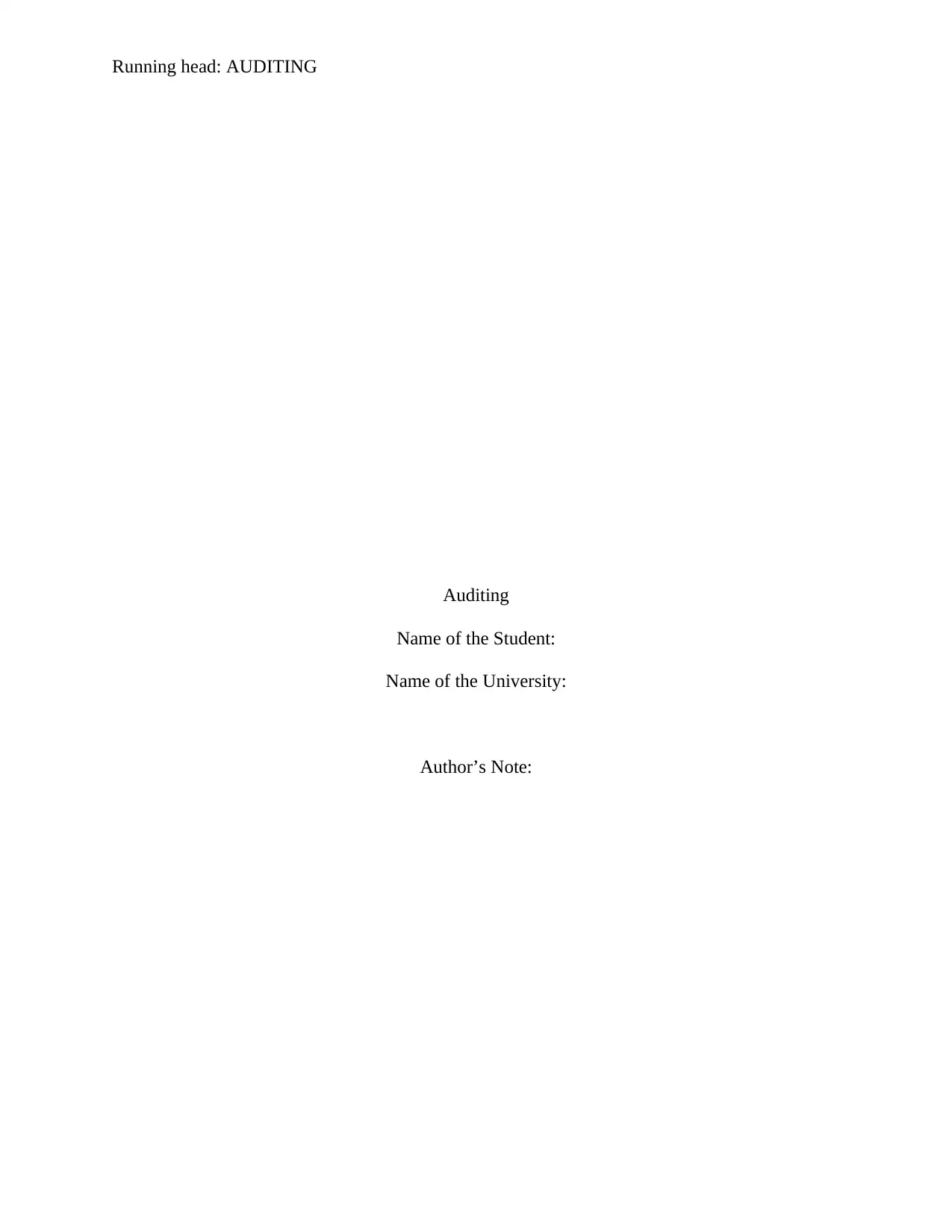
Running head: AUDITING
Auditing
Name of the Student:
Name of the University:
Author’s Note:
Auditing
Name of the Student:
Name of the University:
Author’s Note:
Paraphrase This Document
Need a fresh take? Get an instant paraphrase of this document with our AI Paraphraser
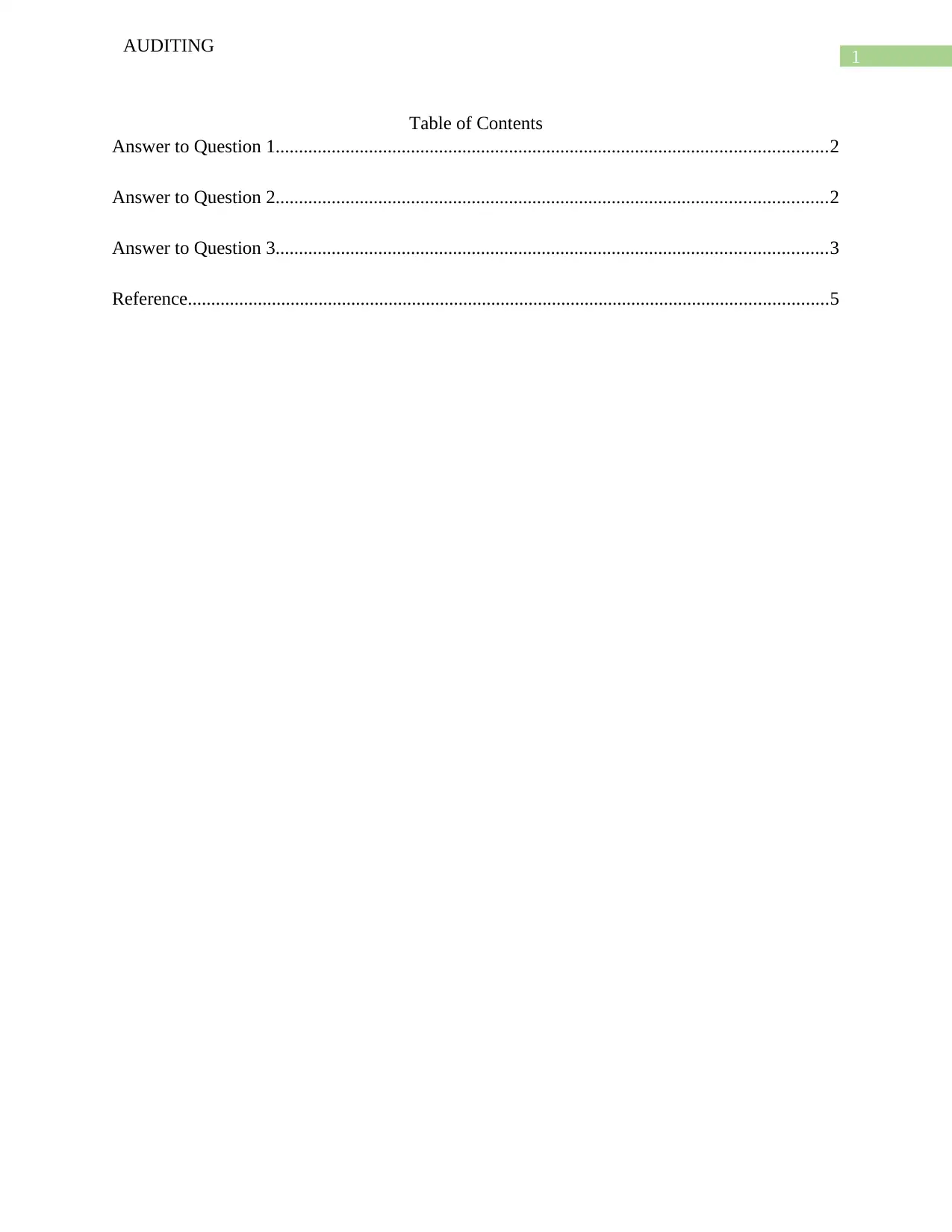
1
AUDITING
Table of Contents
Answer to Question 1......................................................................................................................2
Answer to Question 2......................................................................................................................2
Answer to Question 3......................................................................................................................3
Reference.........................................................................................................................................5
AUDITING
Table of Contents
Answer to Question 1......................................................................................................................2
Answer to Question 2......................................................................................................................2
Answer to Question 3......................................................................................................................3
Reference.........................................................................................................................................5
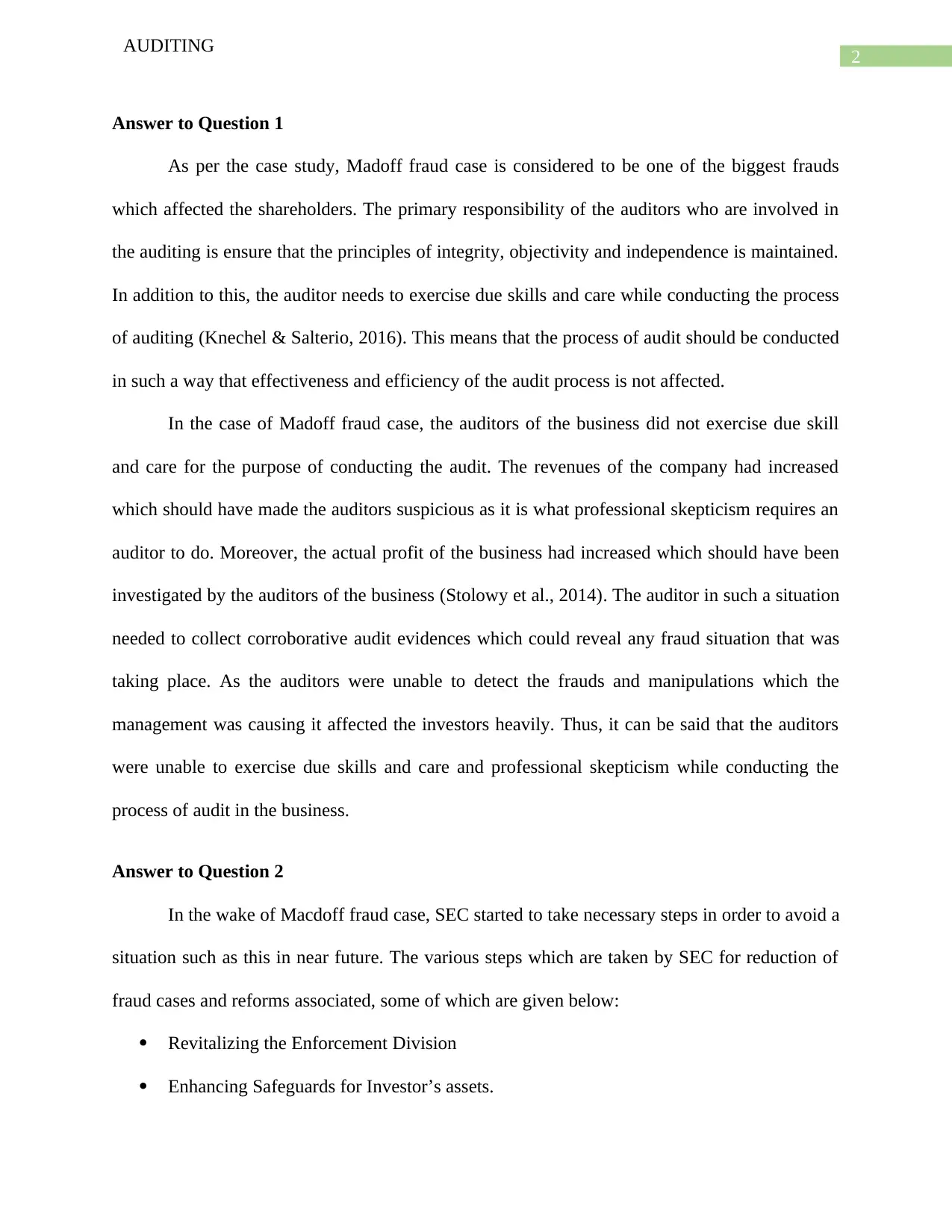
2
AUDITING
Answer to Question 1
As per the case study, Madoff fraud case is considered to be one of the biggest frauds
which affected the shareholders. The primary responsibility of the auditors who are involved in
the auditing is ensure that the principles of integrity, objectivity and independence is maintained.
In addition to this, the auditor needs to exercise due skills and care while conducting the process
of auditing (Knechel & Salterio, 2016). This means that the process of audit should be conducted
in such a way that effectiveness and efficiency of the audit process is not affected.
In the case of Madoff fraud case, the auditors of the business did not exercise due skill
and care for the purpose of conducting the audit. The revenues of the company had increased
which should have made the auditors suspicious as it is what professional skepticism requires an
auditor to do. Moreover, the actual profit of the business had increased which should have been
investigated by the auditors of the business (Stolowy et al., 2014). The auditor in such a situation
needed to collect corroborative audit evidences which could reveal any fraud situation that was
taking place. As the auditors were unable to detect the frauds and manipulations which the
management was causing it affected the investors heavily. Thus, it can be said that the auditors
were unable to exercise due skills and care and professional skepticism while conducting the
process of audit in the business.
Answer to Question 2
In the wake of Macdoff fraud case, SEC started to take necessary steps in order to avoid a
situation such as this in near future. The various steps which are taken by SEC for reduction of
fraud cases and reforms associated, some of which are given below:
Revitalizing the Enforcement Division
Enhancing Safeguards for Investor’s assets.
AUDITING
Answer to Question 1
As per the case study, Madoff fraud case is considered to be one of the biggest frauds
which affected the shareholders. The primary responsibility of the auditors who are involved in
the auditing is ensure that the principles of integrity, objectivity and independence is maintained.
In addition to this, the auditor needs to exercise due skills and care while conducting the process
of auditing (Knechel & Salterio, 2016). This means that the process of audit should be conducted
in such a way that effectiveness and efficiency of the audit process is not affected.
In the case of Madoff fraud case, the auditors of the business did not exercise due skill
and care for the purpose of conducting the audit. The revenues of the company had increased
which should have made the auditors suspicious as it is what professional skepticism requires an
auditor to do. Moreover, the actual profit of the business had increased which should have been
investigated by the auditors of the business (Stolowy et al., 2014). The auditor in such a situation
needed to collect corroborative audit evidences which could reveal any fraud situation that was
taking place. As the auditors were unable to detect the frauds and manipulations which the
management was causing it affected the investors heavily. Thus, it can be said that the auditors
were unable to exercise due skills and care and professional skepticism while conducting the
process of audit in the business.
Answer to Question 2
In the wake of Macdoff fraud case, SEC started to take necessary steps in order to avoid a
situation such as this in near future. The various steps which are taken by SEC for reduction of
fraud cases and reforms associated, some of which are given below:
Revitalizing the Enforcement Division
Enhancing Safeguards for Investor’s assets.
⊘ This is a preview!⊘
Do you want full access?
Subscribe today to unlock all pages.

Trusted by 1+ million students worldwide
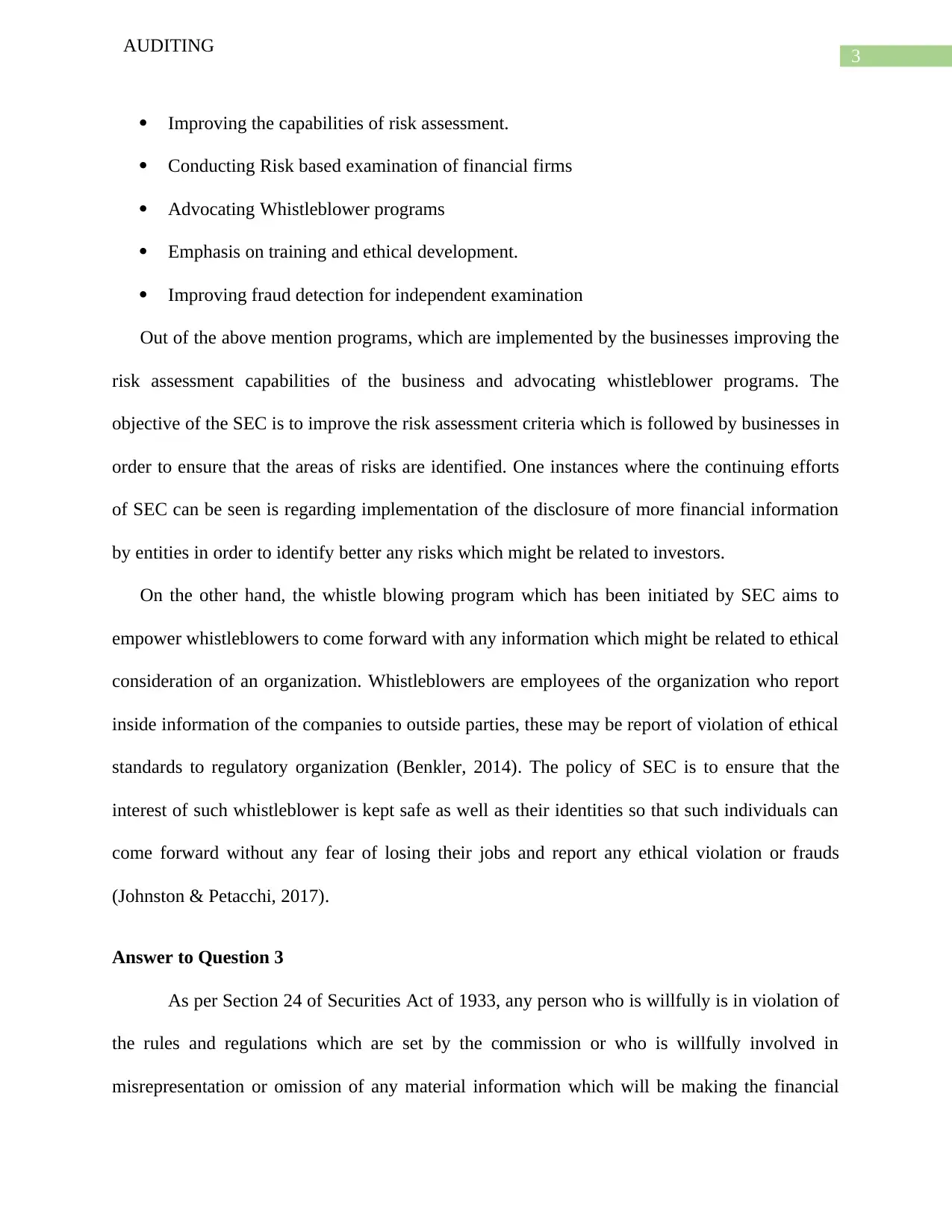
3
AUDITING
Improving the capabilities of risk assessment.
Conducting Risk based examination of financial firms
Advocating Whistleblower programs
Emphasis on training and ethical development.
Improving fraud detection for independent examination
Out of the above mention programs, which are implemented by the businesses improving the
risk assessment capabilities of the business and advocating whistleblower programs. The
objective of the SEC is to improve the risk assessment criteria which is followed by businesses in
order to ensure that the areas of risks are identified. One instances where the continuing efforts
of SEC can be seen is regarding implementation of the disclosure of more financial information
by entities in order to identify better any risks which might be related to investors.
On the other hand, the whistle blowing program which has been initiated by SEC aims to
empower whistleblowers to come forward with any information which might be related to ethical
consideration of an organization. Whistleblowers are employees of the organization who report
inside information of the companies to outside parties, these may be report of violation of ethical
standards to regulatory organization (Benkler, 2014). The policy of SEC is to ensure that the
interest of such whistleblower is kept safe as well as their identities so that such individuals can
come forward without any fear of losing their jobs and report any ethical violation or frauds
(Johnston & Petacchi, 2017).
Answer to Question 3
As per Section 24 of Securities Act of 1933, any person who is willfully is in violation of
the rules and regulations which are set by the commission or who is willfully involved in
misrepresentation or omission of any material information which will be making the financial
AUDITING
Improving the capabilities of risk assessment.
Conducting Risk based examination of financial firms
Advocating Whistleblower programs
Emphasis on training and ethical development.
Improving fraud detection for independent examination
Out of the above mention programs, which are implemented by the businesses improving the
risk assessment capabilities of the business and advocating whistleblower programs. The
objective of the SEC is to improve the risk assessment criteria which is followed by businesses in
order to ensure that the areas of risks are identified. One instances where the continuing efforts
of SEC can be seen is regarding implementation of the disclosure of more financial information
by entities in order to identify better any risks which might be related to investors.
On the other hand, the whistle blowing program which has been initiated by SEC aims to
empower whistleblowers to come forward with any information which might be related to ethical
consideration of an organization. Whistleblowers are employees of the organization who report
inside information of the companies to outside parties, these may be report of violation of ethical
standards to regulatory organization (Benkler, 2014). The policy of SEC is to ensure that the
interest of such whistleblower is kept safe as well as their identities so that such individuals can
come forward without any fear of losing their jobs and report any ethical violation or frauds
(Johnston & Petacchi, 2017).
Answer to Question 3
As per Section 24 of Securities Act of 1933, any person who is willfully is in violation of
the rules and regulations which are set by the commission or who is willfully involved in
misrepresentation or omission of any material information which will be making the financial
Paraphrase This Document
Need a fresh take? Get an instant paraphrase of this document with our AI Paraphraser
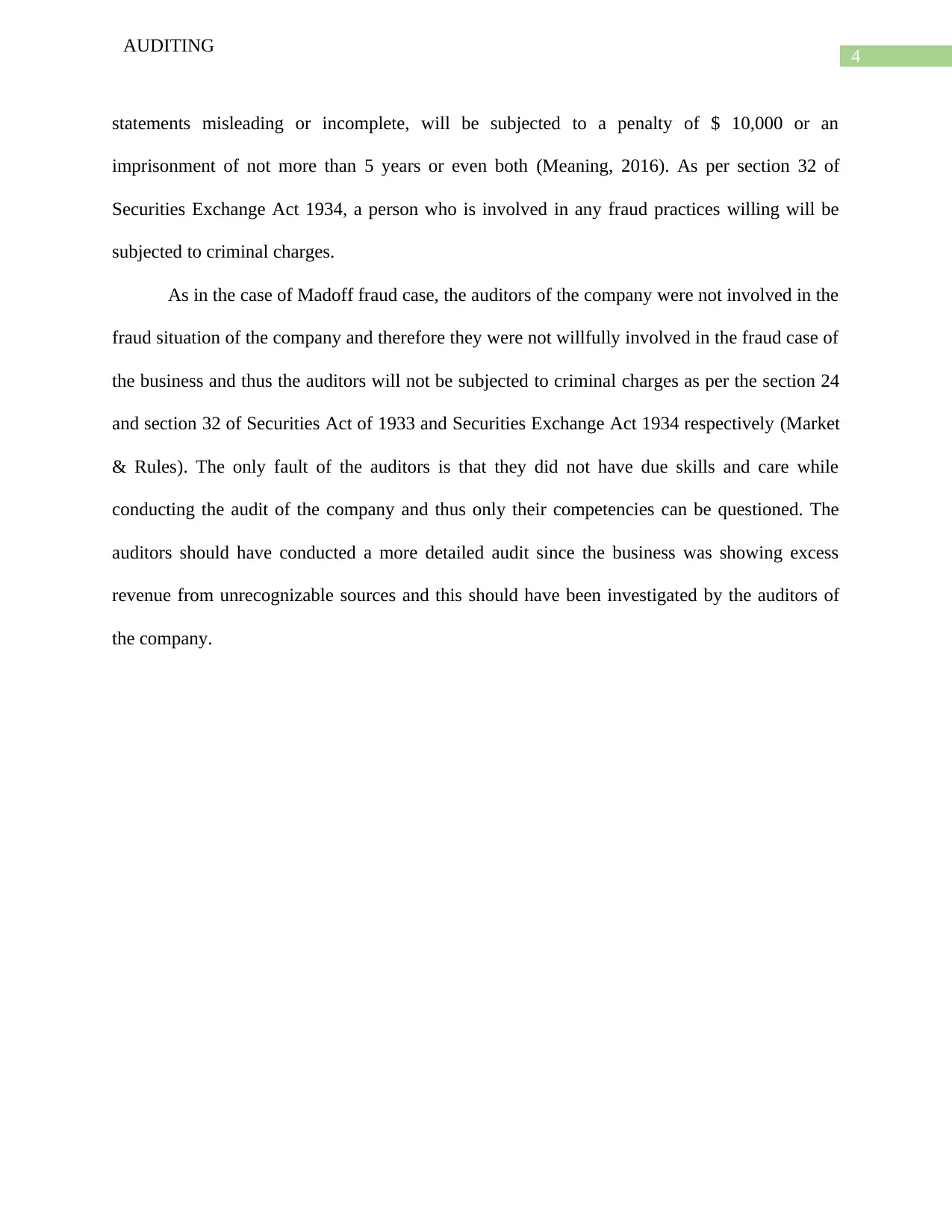
4
AUDITING
statements misleading or incomplete, will be subjected to a penalty of $ 10,000 or an
imprisonment of not more than 5 years or even both (Meaning, 2016). As per section 32 of
Securities Exchange Act 1934, a person who is involved in any fraud practices willing will be
subjected to criminal charges.
As in the case of Madoff fraud case, the auditors of the company were not involved in the
fraud situation of the company and therefore they were not willfully involved in the fraud case of
the business and thus the auditors will not be subjected to criminal charges as per the section 24
and section 32 of Securities Act of 1933 and Securities Exchange Act 1934 respectively (Market
& Rules). The only fault of the auditors is that they did not have due skills and care while
conducting the audit of the company and thus only their competencies can be questioned. The
auditors should have conducted a more detailed audit since the business was showing excess
revenue from unrecognizable sources and this should have been investigated by the auditors of
the company.
AUDITING
statements misleading or incomplete, will be subjected to a penalty of $ 10,000 or an
imprisonment of not more than 5 years or even both (Meaning, 2016). As per section 32 of
Securities Exchange Act 1934, a person who is involved in any fraud practices willing will be
subjected to criminal charges.
As in the case of Madoff fraud case, the auditors of the company were not involved in the
fraud situation of the company and therefore they were not willfully involved in the fraud case of
the business and thus the auditors will not be subjected to criminal charges as per the section 24
and section 32 of Securities Act of 1933 and Securities Exchange Act 1934 respectively (Market
& Rules). The only fault of the auditors is that they did not have due skills and care while
conducting the audit of the company and thus only their competencies can be questioned. The
auditors should have conducted a more detailed audit since the business was showing excess
revenue from unrecognizable sources and this should have been investigated by the auditors of
the company.
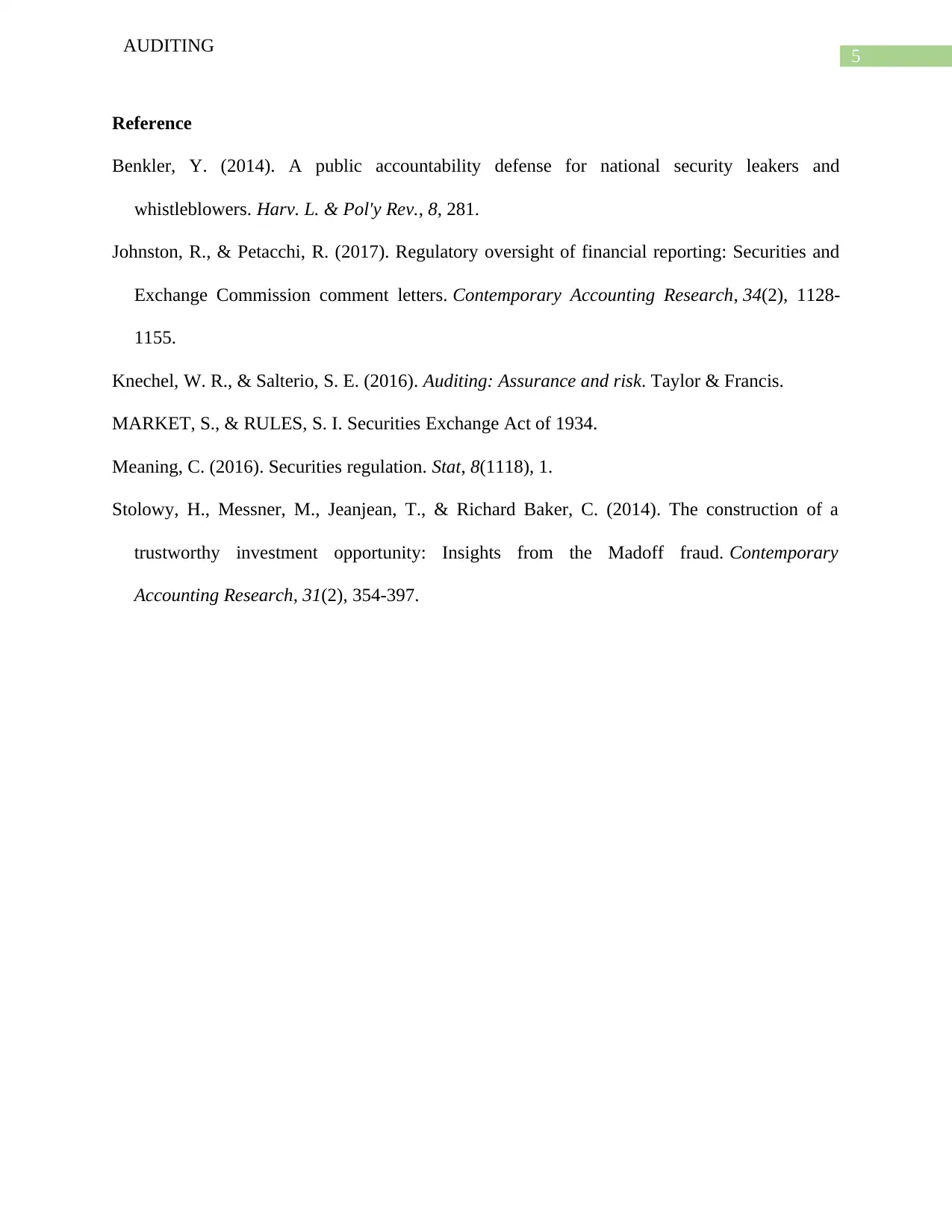
5
AUDITING
Reference
Benkler, Y. (2014). A public accountability defense for national security leakers and
whistleblowers. Harv. L. & Pol'y Rev., 8, 281.
Johnston, R., & Petacchi, R. (2017). Regulatory oversight of financial reporting: Securities and
Exchange Commission comment letters. Contemporary Accounting Research, 34(2), 1128-
1155.
Knechel, W. R., & Salterio, S. E. (2016). Auditing: Assurance and risk. Taylor & Francis.
MARKET, S., & RULES, S. I. Securities Exchange Act of 1934.
Meaning, C. (2016). Securities regulation. Stat, 8(1118), 1.
Stolowy, H., Messner, M., Jeanjean, T., & Richard Baker, C. (2014). The construction of a
trustworthy investment opportunity: Insights from the Madoff fraud. Contemporary
Accounting Research, 31(2), 354-397.
AUDITING
Reference
Benkler, Y. (2014). A public accountability defense for national security leakers and
whistleblowers. Harv. L. & Pol'y Rev., 8, 281.
Johnston, R., & Petacchi, R. (2017). Regulatory oversight of financial reporting: Securities and
Exchange Commission comment letters. Contemporary Accounting Research, 34(2), 1128-
1155.
Knechel, W. R., & Salterio, S. E. (2016). Auditing: Assurance and risk. Taylor & Francis.
MARKET, S., & RULES, S. I. Securities Exchange Act of 1934.
Meaning, C. (2016). Securities regulation. Stat, 8(1118), 1.
Stolowy, H., Messner, M., Jeanjean, T., & Richard Baker, C. (2014). The construction of a
trustworthy investment opportunity: Insights from the Madoff fraud. Contemporary
Accounting Research, 31(2), 354-397.
⊘ This is a preview!⊘
Do you want full access?
Subscribe today to unlock all pages.

Trusted by 1+ million students worldwide
1 out of 6
Related Documents
Your All-in-One AI-Powered Toolkit for Academic Success.
+13062052269
info@desklib.com
Available 24*7 on WhatsApp / Email
![[object Object]](/_next/static/media/star-bottom.7253800d.svg)
Unlock your academic potential
Copyright © 2020–2026 A2Z Services. All Rights Reserved. Developed and managed by ZUCOL.





